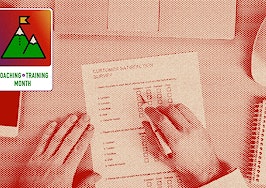Are you receiving Inman’s Agent Edge? Make sure you’re subscribed here.
In Part 1 of WealthQuotient co-founder David Friedman’s five-part series on the keystone habits real estate agents need to effectively prospect wealthy potential clients, you’ll learn how to make the shift from being reactive to proactive. Check in weekly on Fridays and on Agent Edge for your next strategy-turned-healthy-prospecting habit to add more affluent clients to your database.
As Dr. Stephen Covey, author of the bestselling book, The Seven Habits of Highly Effective People, has observed, “Paradigms are powerful because they create the lens through which we see the world … If you want small changes in your life, work on your attitude. But if you want big and primary changes, work on your paradigm.”
What’s more, psychologist and philosopher William James said, “All our life, so far as it had definite form, is but a mass of habits.” It’s true. A study from Duke University suggested that as much as 40 percent of the actions we take every day are not the products of choices — but habits.
We all are aware of the studies and statistics that show that to transform a practice into a habit, we need about two to three weeks of that practice. But just practice is not enough.
As my college swim coach used to drill into us during our hours of swimming each day, “Practice does not make perfect. Perfect practice makes perfect.” It’s not enough just to create new practices and habits. They need to be the right practices supporting the right habits.
Against that backdrop, I wanted to lay out the five keystone habits for effectively prospecting the affluent, distilled from over a decade of advising the top global leaders in luxury (fashion, jewelry, private aviation, yachts), financial services (private banks, multifamily offices and independent advisers) and nonprofits (including institutions of higher education) on how to better access and engage the affluent.
These five habits offer insight and wisdom on how to better prospect any potential client whether mass affluent or a billionaire, but the higher up the wealth tier your prospect is, the more necessary these skills become.
So, every week, I’ll be sharing one of these five habits that will help you in your career.
Regardless of whether you are working with properties and buyers for homes that are half a million or working with billionaires, the principles underlying these habits are fundamental because they deal with the nature of relationships and building trust at a universal human level.
Habit No. 1: Avoid ‘hope marketing,’ and decide to shift your mindset from being reactive to proactive about building your business through referrals
One of the biggest mistakes agents make in building their businesses is they let the “tyranny of the urgent” drive them, and their pipeline ends up controlling them. The challenge is that, at the end of the day, they don’t feel in control. They are whipsawed by their prospects and clients.
In an attempt to maintain some semblance of sanity and engender the feeling that they are doing something proactive, most agents send out copious newsletters, market updates or listings to their own internal CRM database of prospects.
Or they end up chasing leads from lists or articles, spending enormous amount of time and effort to reach individuals they have no relational capital with, representing what we call an “outward-in” prospecting approach.
I came up with the term “hope marketing” as a co-founder at Wealth-X, my last venture, because I saw so many brands across luxury, nonprofit and financial services all recognizing that referrals were a critical component to their business but not doing anything to change the reactive and ad-hoc nature of how they receive referrals.
Many sales professionals respond to the idea of being more proactive and systematic about referrals by saying they don’t want to be too aggressive with their clients.
The reality is that just reactively waiting for referrals ensures that you are not in control, and it may be the case that your client/relationship is sending you whoever is top-of-mind (which often are people they might not worry about damaging their social capital).
By not being proactive, you are actually tacitly expecting your clients to do your work for you by building your pipeline. You are “hoping” that you are serving your clients well enough and they actually appreciate you enough, and then you are “hoping” that if they have a friend who is need, that they will remember you.
Being proactive is not aggressive. It’s strategic because it saves you and your clients time in the process. As we all know, “hope” is not a strategy.
Baby-step activation tool
Decide that you stop practicing “hope marketing” based on your hope that if you serve your clients well enough, the referrals will just continue to roll in and be enough to sustain your business.
Determine that you will have an “inward-out” mindset and approach that recognizes that referrals are the key driver of new client acquisition.
The mark that you have made this mindset shift from reactive and ad-hoc “hope marketing” to proactive and strategic growth is that you catch yourself the next time this question start to utter this question, “How do I get to [fill in the blank]?”
Weekly challenge
Resolve that you will refuse to ask “How do I get to [fill in the blank],” and start a mindset change to asking how can foster and architect a specific referral.
Declare that you will not waste time on “outward-in” approaches that sap your time and resources but that you will spend time on “inward-out” referral-driven strategies.
David Friedman is the co-founder of WealthQuotient. Connect with him on LinkedIn or Twitter.













